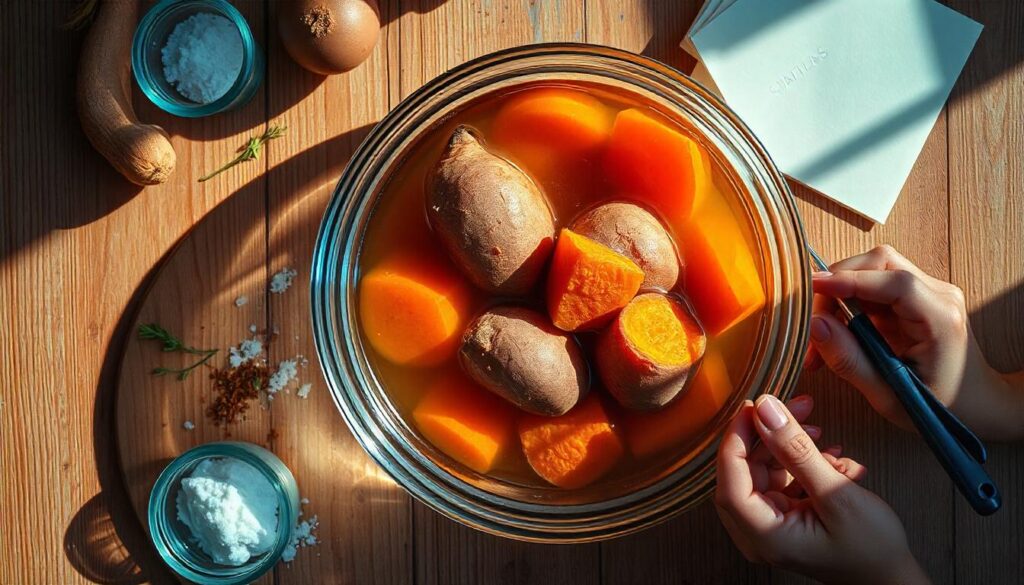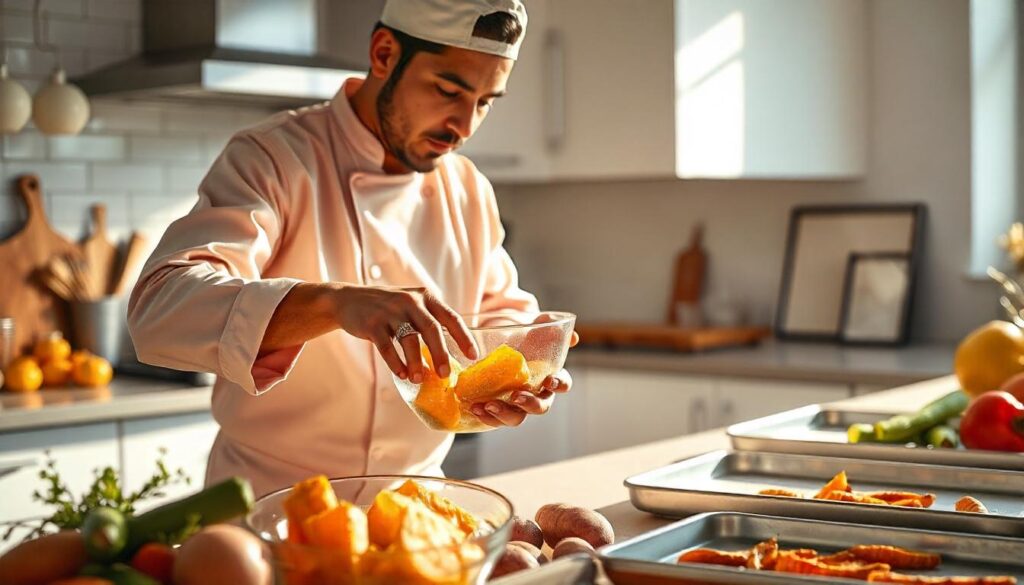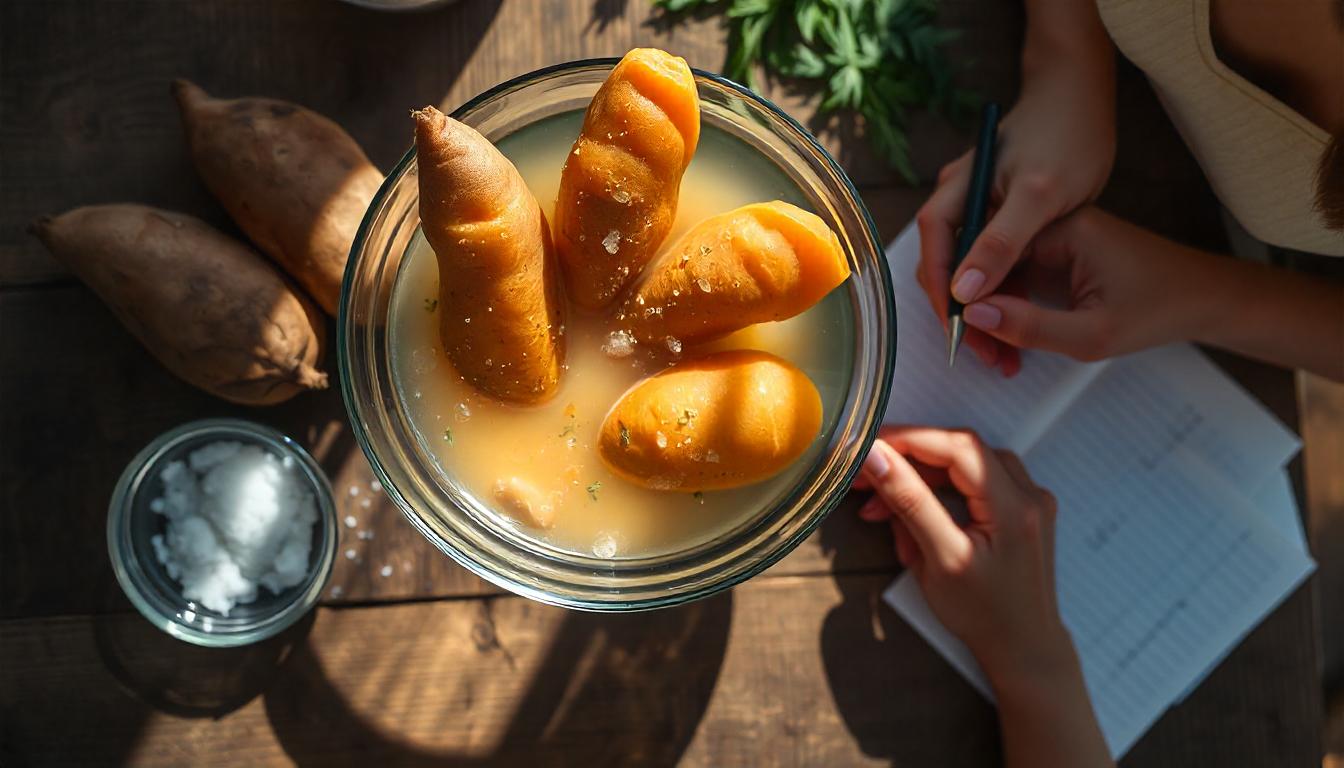Why Do You Soak Sweet Potatoes Before Baking? Sweet potatoes are beloved for their versatility and nutritional benefits, finding their way into everything from savory meals to decadent desserts. However, a common question arises: Why should you soak sweet potatoes before baking? While some might dismiss this step as unnecessary, soaking can have transformative effects on the texture, flavor, and even cooking process. In this detailed guide, we’ll uncover the science, methods, and reasons behind soaking sweet potatoes before baking.

Table of Contents
What Does Soaking Sweet Potatoes Mean?
Before diving into the benefits, it’s essential to understand what soaking entails. Soaking sweet potatoes involves submerging them in water for a specific duration, often ranging from 30 minutes to overnight. The process is straightforward but highly impactful. By soaking, you remove the excess starch that clings to the surface of the sweet potatoes. This starch is often responsible for preventing caramelization and creating soggy results.
Additionally, soaking allows the sweet potatoes to absorb some water, which helps them cook more evenly and ensures a fluffy, tender interior. While the water used is typically plain, some recipes suggest adding salt to the soaking water for a subtle seasoning boost. This preparation step can make a significant difference in the final outcome of your dish.
For a delightful pairing with baked sweet potatoes, you might want to explore Sweet Potato Cornbread, a dish that highlights their flavor perfectly.
The Science Behind Soaking Sweet Potatoes
To fully appreciate why soaking is beneficial, let’s explore the science behind the process. Sweet potatoes are rich in starch, which affects how they bake. When you soak sweet potatoes, the surface starch begins to break down and leach into the water. This reduction in starch allows for better caramelization during baking. As a result, the sweet potatoes develop a golden-brown exterior that is crispy and flavorful.
Moreover, soaking ensures that heat penetrates the sweet potatoes more evenly, leading to consistent cooking. Without this step, you might encounter areas that are overcooked and others that remain underdone. By promoting even cooking, soaking not only enhances the texture but also reduces the baking time. This can be especially helpful when preparing meals on a tight schedule.
If you’ve ever wondered why some sweet potato dishes don’t achieve the desired crispiness, it’s often due to the starch remaining on the surface. Recipes like Why Don’t Sweet Potatoes Get Crispy? delve deeper into this issue and highlight the importance of soaking.
Benefits of Soaking Sweet Potatoes Before Baking
Now that we’ve covered the basics and science, let’s examine the specific benefits of soaking sweet potatoes before baking.
1. Enhances Texture and Crispiness
One of the primary reasons for soaking sweet potatoes is to improve their texture. The removal of starch allows the exterior to crisp up beautifully during baking. This is particularly important if you’re aiming for roasted sweet potatoes with golden edges and a soft interior. Without soaking, the excess starch can trap moisture, resulting in a soggy texture.
Additionally, soaking ensures a more uniform texture throughout the sweet potato. The absorbed water helps to soften the interior, creating a delightful contrast to the crispy exterior.
2. Improves Flavor
Another compelling reason to soak sweet potatoes is the enhancement of flavor. By removing starch, you enable the natural sugars within the sweet potatoes to caramelize more effectively. This caramelization is what gives baked sweet potatoes their rich, sweet taste.
Furthermore, soaking sweet potatoes in salted water can elevate their flavor profile. The salt subtly seasons the potatoes from within, enhancing their natural sweetness and making them even more delicious. This step is especially beneficial if you plan to pair your baked sweet potatoes with savory dishes.

For an in-depth look at flavor enhancement techniques, consider exploring recipes like Do I Need to Peel Sweet Potatoes Before Baking?, which discuss the impact of preparation methods.
3. Reduces Cooking Time
Time is often a critical factor in meal preparation, and soaking sweet potatoes can help streamline the process. By reducing the starch content, you allow heat to penetrate the sweet potatoes more efficiently. This results in faster baking times, making it an ideal technique for busy weeknights or large gatherings.
4. Supports Healthier Cooking
Soaking sweet potatoes isn’t just about improving taste and texture—it also has health benefits. By removing some of the starch, you lower the glycemic index of the sweet potatoes. This means they’ll have a less dramatic impact on blood sugar levels, making them a better option for those managing diabetes or looking to maintain steady energy levels.
Additionally, soaking can reduce the formation of potentially harmful compounds like acrylamide, which can occur during high-temperature cooking. This makes soaking a valuable step for anyone seeking to optimize the nutritional benefits of sweet potatoes.
Proper Soaking Techniques
To reap the full benefits of soaking sweet potatoes, it’s essential to follow proper techniques. Here are some tips to guide you:
- Use Cold Water: Always soak sweet potatoes in cold water to prevent premature cooking. Warm water can alter the texture and make the sweet potatoes mushy.
- Soak for the Right Duration: Aim for at least 30 minutes, but no longer than 24 hours. Prolonged soaking can cause the sweet potatoes to lose some of their water-soluble nutrients.
- Rinse Thoroughly: After soaking, rinse the sweet potatoes under cold running water to remove any residual starch. This ensures optimal results during baking.
If you’re wondering whether soaking sweet potatoes affects their peel, you can find insights in articles like Do I Need to Peel Sweet Potatoes Before Baking?.
FAQs: Addressing Common Questions
Why should I soak sweet potatoes before baking?
Soaking sweet potatoes removes starch, enhances texture, and improves caramelization, resulting in a superior dish.
Can I soak sweet potatoes overnight?
Yes, but ensure they’re stored in the refrigerator to prevent bacterial growth.
Does soaking impact the nutritional value of sweet potatoes?
While some water-soluble nutrients may leach out, the overall nutritional profile remains intact, and the benefits of soaking often outweigh this minor loss.
What happens if I don’t soak sweet potatoes?
If you skip soaking, your sweet potatoes might bake unevenly, and the texture could be less crispy.
When Should You Skip Soaking?
While soaking is beneficial in most cases, some recipes don’t require this step. For example:
- Mashed sweet potatoes don’t benefit from the crisping effects of soaking.
- Sweet potato casseroles, such as the Ruth Chris Sweet Potato Casserole, are typically prepared with unsoaked sweet potatoes to retain their creamy texture.
Conclusion

Soaking sweet potatoes before baking is a simple yet effective technique that can elevate your cooking. From improving texture and flavor to promoting healthier cooking methods, this step offers numerous advantages. Whether you’re preparing roasted sweet potatoes, fries, or a savory side dish, soaking ensures a superior result every time. Embrace this technique in your next meal, and experience the difference it makes in your culinary creations.

